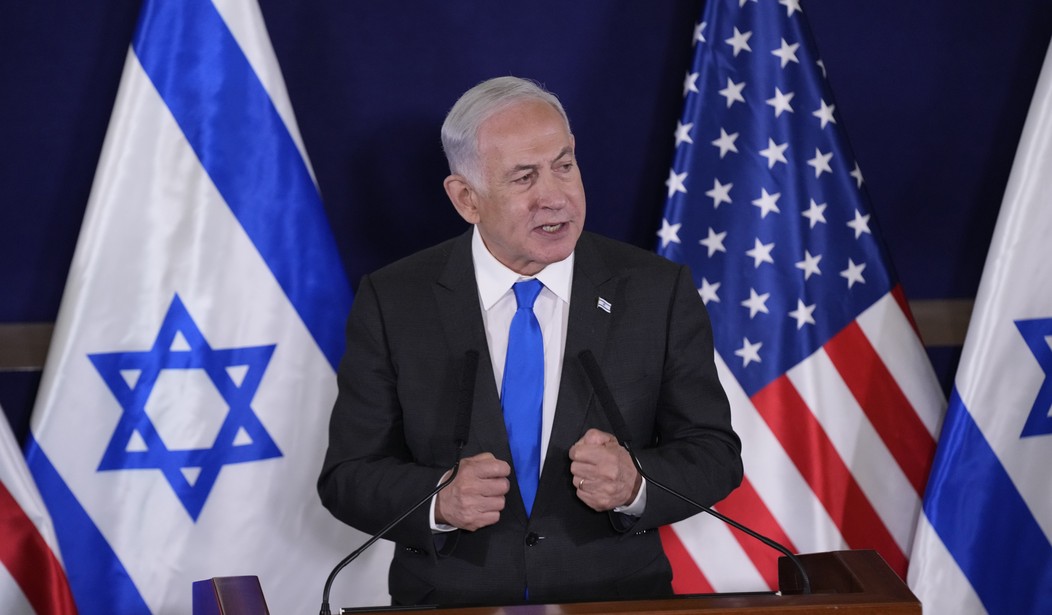Benjamin Netanyahu forcefully answered demands from allies inside and outside of Israel with a declaration of total victory. Or did he? As reports of new negotiations for another hostages-for-prisoners deal continue to percolate, the PM insisted that Israel plans to fight this war to its conclusion, once and for all:
“The war will continue until we destroy Hamas – until victory,” Netanyahu said in a recorded statement. “Those who think we will stop is not connected to reality,” the prime minister continued.
“We are striking Hamas with heavy fire everywhere, including today. We are also striking those who aid Hamas, close or far,” Netanyahu said.
“Every Hamas terrorist is destined for death. They have only two options: Surrender or die.”
Netanyahu has made that plain since October 8th. If anything, this position has become more obviously firm in recent weeks. Israel has no intention of stopping now, not when they have finally gained some sort of control over Hamas’ infrastructure, and while they now appear to have substantially disrupted rocket and missile attacks from Gaza. After doing this much damage to Gaza’s infrastructure in pursuit of Hamas, a decision to end the fight with Hamas leadership and arms still in the field would mean Israel could never return to finish the job later. It would be politically impossible, both with Israelis and with Israel’s allies.
For now, the Biden administration still signals support for Netanyahu’s position, albeit in vague and general terms of the Hamas “threat.” Antony Blinken still insists on including warnings about civilian casualties, as though Israel needs the reminder:
“We continue to believe that Israel does not have to choose between removing the threat of Hamas and minimizing the toll on civilians in Gaza,” Blinken said in an end-of-the-year news conference. “It must do both and it has a strategic interest to do both.”
True, but Netanyahu and Benny Gantz hardly need the architects of the Kabul bug-out to remind them of it. And Blinken is still trying to dictate the “intensity” of Israel’s offensive against Hamas:
“It’s clear that this conflict needs to move — will move — to a lower intensity phase,” Blinken says. “We expect to see, and want to see, a shift to more targeted operations, with a smaller number of forces that are really focused on dealing with the leadership of Hamas, the tunnel network and a few other different things.”
“As that happens, you’ll see the harm done to civilians decrease significantly,” the US secretary of state adds.
That may have prompted a Netanyahu rebuke in the speech. At one point, he declared that “anyone who thinks we’ll stop the war is unmoored from reality.” That may not have been aimed explicitly at Blinken, but it certainly suggests that Israel isn’t anticipating the use of Blinken’s military advice any time soon.
However, it’s worth remembering that this firm position on total victory didn’t preclude Netanyahu from agreeing to the “operational pause” in November. That arrangement freed over 100 hostages from Hamas, in exchange for three times as many Palestinian prisoners in Israeli jails. Pressure to enter another “pause” for an exchange keeps growing, and not just externally. The families of the hostages keep escalating their political fight for their relatives, so much so that the more conservative elements of the unity government have begun lashing out at the idea of another “pause”:
Finance Minister Bezalel Smotrich hits out at negotiations for another hostage release deal with Hamas, in response to a report that the war cabinet gave permission for Mossad head David Barnea to discuss freeing high-level security prisoners in return for Israeli captives held in Gaza.
“The war cabinet should send the head of the Mossad to eliminate Hamas leaders wherever they are, and not to talk with them and conduct negotiations,” says Smotrich, who is a member of the security cabinet but not the war cabinet.
Netanyahu, whose political career is almost certainly over at the end of this war, still needs to walk a delicate balance between all of these constituencies. He also has to keep Israelis on side in case the war expands in the north beyond the low-level exchanges with Hezbollah that continue to this hour. Netanyahu and Gantz have worked well together so far since the start of the war despite their bitter rivalry in Israeli politics, and the success of the mission against Hamas requires that unity to continue.
Don’t be surprised if Netanyahu again makes a distinction between “pauses” and “cease-fires” in the coming hours or days. But if Hamas really wants a pause for their own purposes, they’ll need it quickly. “Days” may be too late in Khan Younis.








Join the conversation as a VIP Member